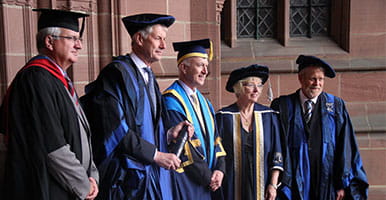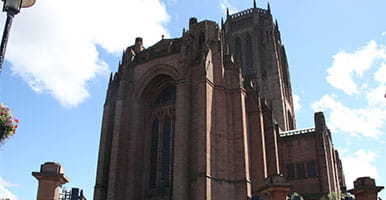Lord Martin Rees
Presented by Professor Frank Sanderson
Honorable Pro-Chancellor, I have pleasure in presenting Lord Rees of Ludlow for the award of an Honorary Fellowship from Liverpool John Moores University.
Even in the early 1970s, Martin Rees's extraordinary breadth of knowledge and expertise were apparent.
Pick almost any topic in astronomy or physics, and he would have a carefully evaluated position worked out. He is one of only a few great scientists who is both open-minded and healthily-skeptical.
At a time in his career when he could justifiably rest on his laurels, Martin Rees is as energetic and active as ever, offering stunning insights into many emerging scientific fields.
This tribute from Professor Paul Davies gives an insight into the outstanding contribution Martin Rees has made to science in general and cosmology and astrophysics in particular over the last four decades.
The son of teachers, he was born in 1942 in York, and has a connection with Liverpool through his father Reginald, who was born in West Derby. Martin grew up in Shropshire and went to Shrewsbury School and then to study mathematics at Trinity College, Cambridge before moving into astrophysics in the late 1960s. With new evidence of the Big Bang and early evidence of black holes, he recalls that it was a great time for a young cosmologist to make a mark in a new subject.
After gaining his doctorate at Cambridge in 1967, he held post-doctoral positions in the UK and the USA, before becoming a professor at Sussex University in 1972. The next year he succeeded Fred Hoyle as the Plumian Prof of Astronomy and Experimental Philosophy at the University of Cambridge.
Since then, he has maintained his connection with Cambridge in a number of professorial roles and had two periods as Director of the Institute of Astronomy. He became Professor of Cosmology and Astrophysics in 2002 and from 2004, he has been Master of Trinity College, an office which requires the holder to be of the highest academic distinction.
Throughout his career, he has held numerous honorary and visiting appointments, at for example Caltech, Princeton, Harvard, the Smithsonian Institution, Leicester and Imperial College.
Lord Rees is also a prolific writer on scientific topics and has authored or co-authored over 500 research papers and has published 7 books, most of which are accessible to the non specialist. He has also published many magazine and newspaper articles on scientific and general subjects.
His eminence in his field has led to numerous memberships of academies world-wide, and many awards, honours and appointments, for example: he has received the Niels Bohr Prize from Unesco, The Faraday Award from the Royal Society, The Einstein Award of the World Cultural Council and The Gold Medal of the Royal Astronomical Society.
He has received 12 Honorary Doctorates and 5 Honorary Fellowships He has been president of various societies, including the Royal Astronomical Society and the British Association for the Advancement of Science, and a trustee of, inter alia, the British Museum, The Kennedy memorial Trust, the National Endowment of Science, Technology and the Arts, and the Institute of Public Policy Research.
In 1979, he was made a Fellow of the Royal Society, an honour reserved for the most eminent scientists in the UK and Commonwealth, and was elected its President in 2005. He is a foreign associate of the National Academy of Sciences, the American Philosophical Society, and the American Academy of Arts and Sciences, and is an honorary member of the Russian Academy of Sciences, the Pontifical Academy, and several other foreign academies.
He was Knighted in 1992 for his services to science, and appointed to the honorary position of Astronomer Royal in 1995.
He has served on many bodies connected with education, space research, arms control and international collaboration in science. In 2005 Sir Martin was appointed to the House of Lords sitting on the Cross benches and assuming the title of Lord Rees of Ludlow.
Today, he concentrates less on teaching and more on writing and broadcasting, especially on subjects close to his heart, such as the study of black hole formation, gravitational waves and gamma rays. He acknowledges that the mysteries we seek to understand may be out of our reach. He notes that "My dog can't understand quantum mechanics and there's no guarantee that the laws of nature will match what human brains can understand either." But that doesn't stop his curiosity and his quest for understanding.
Comments from fellow scientists are universally positive about Lord Rees and indicative of his eminence: The finest all-round theoretical physicist of his generation; incredibly knowledgeable; wonderfully helpful to his colleagues; he has made important contributions to almost every aspect of astrophysics, and from Professor David Deutsch of Oxford University, I do not always agree with him but I always want to know his opinion. As does every wise person.
Martin Rees has been at the cutting edge of cosmology for four decades, reaching the peak of his profession and showing no signs of receding into the background.
He is an example and inspiration to all who have a curiosity about our universe, and we are delighted to be able to honour him today.
Thus I have great pleasure in presenting Lord Rees of Ludlow, this most distinguished person, for admission to our highest honour of Fellow of Liverpool John Moores University.



